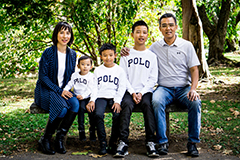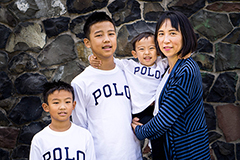IU East graduate longs for normalcy after virus
This tragedy is so horrible because you can’t see it.

(Left to right) Noriko Kuwahara, Jake Susanto, Jayden Susanto, Joshua Susanto and Hendrata Susanto. Photo by Kathy Behrmann
The killer coronavirus (COVID-19) does its work stealthily, steadily and indiscriminately.
That’s so different from 9/11, the violent and horrific event that Indiana University East graduate Noriko Kuwahara endured in New York City.
She was there to see the smoke and ashes after hijacked jets slammed into the Twin Towers, bringing them down and killing nearly 3,000.
And, now, she is riding out the current pandemic and ready for the return of normalcy in the NYC area.
If the Twin Towers attacks had happened earlier in 2001, Kuwahara could have died in the act of terrorism. She had left a job that was on the 80th floor of the South Tower.
“It was far more psychologically terrifying than the coronavirus. We were afraid of everything,” Kuwahara says. “It was like a war zone, or something surreal out of a movie scene.”

(Left to right) Jayden Susanto, Joshua Susanto, Jake Susanto and Noriko Kuwahara. Photo by Kathy Behrmann.
It took her until early evening on 9/11 – after wandering, waiting, worrying – to find a crowded train that could get to New Jersey. “It was crazy,” she says.
This time, the war zone caused by the coronavirus virus is all around her, with the local epicenter just down the street from her home at a major hospital in Morristown, New Jersey.
“The hospital has tents outside to triage incoming patients with COVID-19-like symptoms,” she said.
The pandemic is a stealthy killer. That’s what makes it so different and so fearful. “You can’t see what your enemy is. It’s invisible,” Kuwahara says. “It’s everywhere.”
This time is different, too. “Now, I can’t just worry about me.”
Kuwahara has three sons, Jake (4), Jayden (9) and Joshua (13), with her husband, Hendrata Susanto, whom she met in NYC. They are all essentially stuck at their home that is about 30 miles west of NYC. “He (Jake) doesn’t understand not touching stuff outside or not putting his hands to his face,” Kuwahara says.
By necessity, she is a stay-at-home mom.
Her husband, a financial system engineer, is able to work from home. “As long as he has a computer and Wi-Fi, he is good to go,” Kuwahara says.
There is a lot more computer use at their home as the children must use them now since they can’t attend school. Their seventh-grader has a Chromebook and works directly with his teacher. Remote learning started for all students there on March 18. “I am supervising them,” Kuwahara says. “My third-grader still needs help. It’s a full-time job.”
She had a recent scare after visiting a doctor for a checkup. The day after the visit, her doctor started showing signs of the COVID-19 virus. She lay awake while worrying every night until she had passed 14 days without signs that she had contracted it. “It was really, really scary, especially the first week,” she says.
After making it through the horrific times around 9/11 – and also experiencing the scary blackout of 2003 – she knows people will persevere with this tragedy and get past it, too.
Kuwahara graduated from IU East in 1999. She first became acquainted with eastern Indiana as a junior when she attended Union High School in Modoc as an exchange student.
She regularly visited friends in Richmond and knew quickly that she wanted to come back again.
Kuwahara returned to Tokyo, Japan, with the intent to save money and return to Indiana for higher education. She studied two years at the English School and worked at a U.S. Naval base.
Her dream came true when she started attending IU East. She graduated in 1999 with a bachelor’s degree in behavioral social science.
Kuwahara made a lifetime impression on IU East while completing a class project on campus. She raised money to buy cherry trees and planted them between Tom Raper Hall and Whitewater Hall. They were dedicated in a ceremony on April 9, 1997, and still blossom each spring.
Kuwahara returned to Richmond – “my second home” – last spring to visit friends and the trees. She had planned to return this year on the first weekend of April, but that became impossible with the pandemic.
After graduating from IU East, she headed to work at a small IT company in NYC.
Now, her full-time job is being a mom. Ordinarily, that would mean transporting her sons to three different schools and a regular mix of practices: swim team, piano lessons, jazz band and orchestra.
Her children attend a Japanese language school on Saturdays. The school is currently closed and plans to reopen for online learning in late April. And she finds time to visit with others in a chat room. “We have mom’s night out on Zoom,” she jokes.
Kuwahara longs for normalcy.
“You appreciate what you have, the freedom to go out. Oh, I wish I could see my friends. I would appreciate just eating pizza in a pizza shop.”
Her favorite restaurant is in NYC, but she is fearful it won’t re-open after this crisis ends.
The friendship with a woman in Shanghai, China, gave Kuwahara a head start on dealing with the pandemic.
“She told me to get N95 masks and this (item) if there is a shutdown,” Kuwahara says. “She introduced me to the quarantine lifestyle. When the virus hit Washington state and California … I knew it had reached us. I started buying non-perishables. I was able to plan for those things.”
Despite all of the planning, it isn’t easy.
“It’s tough here,” she says, noting many stores have long lines to enter. “I wear the full gear, glasses, mask, disposable gloves. I just shop for 10 minutes, then come home and shower.”

